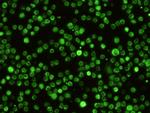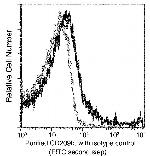Search Thermo Fisher Scientific
Invitrogen
SIGN-R1 Recombinant Rabbit Monoclonal Antibody (143)
FIGURE: 1 / 2
SIGN-R1 Antibody (MA5-29668) in ICC/IF


Product Details
MA5-29668
Species Reactivity
Host/Isotype
Expression System
Class
Type
Clone
Immunogen
Conjugate
Form
Concentration
Purification
Storage buffer
Contains
Storage conditions
Shipping conditions
RRID
Product Specific Information
This product is preservative free. It is recommended to add sodium azide to avoid contamination (final concentration 0.05%-0.1%).
Recombinant rabbit monoclonal antibodies are produced using in vitro expression systems. The expression systems are developed by cloning in the specific antibody DNA sequences from immunoreactive rabbits. Then, individual clones are screened to select the best candidates for production. The advantages of using recombinant rabbit monoclonal antibodies include: better specificity and sensitivity, lot-to-lot consistency, animal origin-free formulations, and broader immunoreactivity to diverse targets due to larger rabbit immune repertoire.
This antibody has specificity for Mouse SIGNR1/CD209b.
Target Information
SIGNR1 is a type II transmembrane C-type lectin that was identified in a search for mouse homologues of human DC-SIGN. It is expressed at high levels in splenic marginal zone macrophages and lymph node medullary macrophages, where it functions to uptake dextran polysaccharides, including the capsular polysaccharide of Streptococcus pneumoniae. It has also been demonstrated that SIGNR1 physically associates with TLR4/MD2, and it has been suggested that this association plays a role in recognition of LPS. Furthermore, recently it has been shown that SIGNR1 deficient mice have a defect in catabolism of the complement component C3, and that SIGNR1 binds directly to the complement C1 subcomponent, C1q to assemble a non-conventional C3 convertase.
For Research Use Only. Not for use in diagnostic procedures. Not for resale without express authorization.
References (0)
Bioinformatics
Protein Aliases: CD209; CD209 antigen-like protein A; CD209 antigen-like protein B; DC SIGNR1; DC-SIGN; DC-SIGN-related protein 1; DC-SIGNR1; Dendritic cell-specific ICAM-3-grabbing non-integrin; MGC130443; OtB7
Gene Aliases: 1810030I22Rik; CD209; Cd209a; Cd209b; CDSIGN; CIRE; DC-SIGN; DC-SIGN1; DC-SIGNR1; Dcsign; mSIGNR1; OtB7; SIGN-R1; SIGNR1; SIGNR5
UniProt ID: (Mouse) Q91ZX1, (Mouse) Q8CJ91
Entrez Gene ID: (Mouse) 170786, (Mouse) 69165

Performance Guarantee
If an Invitrogen™ antibody doesn't perform as described on our website or datasheet,we'll replace the product at no cost to you, or provide you with a credit for a future purchase.*
Learn more
We're here to help
Get expert recommendations for common problems or connect directly with an on staff expert for technical assistance related to applications, equipment and general product use.
Contact tech support
